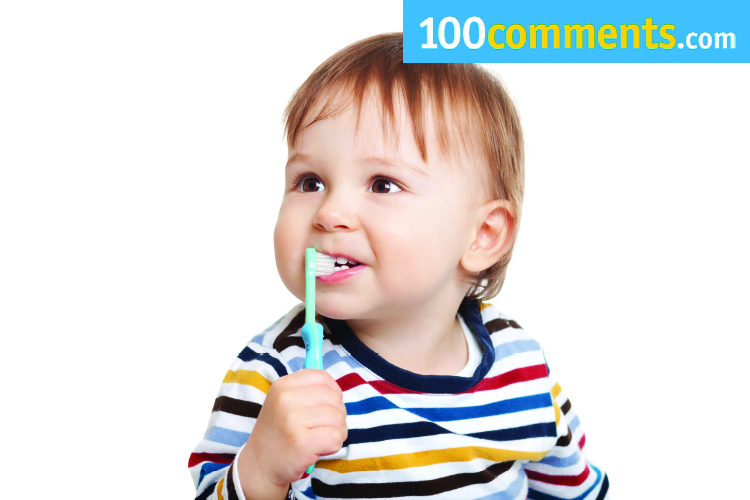Primary teeth, also known as baby teeth or milk teeth, are more important than they seem to be. Premature loss of a primary tooth may cause remaining teeth to move, affecting the space meant for adult teeth. Primary tooth decay is also not to be ignored for it is capable of causing painful and harmful infections in babies and toddlers.
Table of Contents
Why tooth decays happen in babies
A baby’s mouth is not exempted from acid-producing bacteria that can give way to tooth decay. In many cases, parents and caregivers were found to have passed bacteria to babies through their saliva. This can easily take place when spoons or cups are shared when adults taste or test their baby’s food and drinks. Another way this can happen is when adults clean off pacifiers using their mouth.
Exposure to any liquid or food other than water for long periods or frequently throughout the day may also cause primary tooth decay among babies and toddlers. Sugars, even naturally occurring ones, are changed to cavity-causing acid by bacteria in the mouth. The most common way this happens is when parents put their children to bed with a bottle of formula, milk, juice (even when mixed with water).
It may be a tough concept to grasp for parents who didn’t know any better, but milk or juice should be served only with meals and not offered throughout the day, at nap time or at bedtime.
For the sake of good dental health as well as overall well being, little children should not be frequently sipping anything from a sippy cup or bottle during the day or night, other than plain water.
Signs of Tooth Decay in Babies
Early signs of tooth decay in babies and toddlers are almost impossible to detect, even for a dentist, without proper equipment. They may first appear as white spots at the gum line on the upper front teeth. Early treatment is essential to hopefully prevent further damage and help keep the affected teeth intact till it’s time for it to fall out.
How to Prevent Tooth Decay in Babies
It does not matter if you’re breastfeeding or bottle-feeding, it is important to take good care of your baby’s teeth from the time the first tooth appears. Here are some pointers to take note of:
- If your baby’s teeth have not popped out yet, keep the little one’s mouth clean by gently wiping the gums with a clean baby washcloth.
- Once you see the first teeth, gently brush using a soft baby toothbrush and a dot of toothpaste meant for primary teeth.
- If your child is between one to three years old, encourage teeth-brushing twice a day with a smear of kids toothpaste after breakfast and before bed. Remember, no more bottles after brushing those teeth clean!
Make the change to regular cups ASAP
Teach your child to drink from a regular cup as soon as possible, preferably by 12 to 15 months of age. Drinking from a cup is less likely to cause liquid to collect around the teeth. Also, a cup cannot be taken to bed.
Where’s my sippy cup, Mommy?
If your child must have a bottle or sippy cup for long periods, fill it with water only. During car rides, offer only water if your child is thirsty.
Watch those sugars, because junior won’t
It is indeed a rare little one who does not fancy sweet-tasting stuff, but as parents you’ll have to try your best to limit the intake of sweet or sticky foods your child eats, such as candy, gummies and marshmallows. Even cookies and some crackers, as long as they taste sweet, are likely to contain more sugar than a child needs. These foods are not only bad for little teeth, but also for a child’s overall health, so try reserving them for occasional treats instead of regular snack. Similarly, juices and other sweet drinks should ideally be served only during meal times, after which little teeth can be cleaned and kept clean until the next meal.
Your child’s dentist appointment
Remember, tooth decay can be prevented. Make an appointment to have your child see the dentist before the age of one year. Talk with your child’s doctor or dentist if you see any sign of decay in your child’s teeth or if you have questions about your child’s teeth. With the right care, your child can grow up to have healthy teeth, which is an essential part of a healthy self-esteem.
Taking the initiative
Parents should make an effort to limit food and drinks over the course of the day to the recommended three meals and two snacks (with healthy food choices and limited sweet foods and drinks). Make teeth-brushing a habit after every meal and before bedtime too.
Tooth decay does not discriminate and can occur in any set of teeth, including primary teeth. This is why proper dental care should be prioritised in babies and toddlers, just as any other healthcare areas during the childhood ages.
Fruit juices
Fruit juices are generally not recommended for babies younger than six months of age. If juice is given to babies between 6 to 12 months, it should be limited to 4 ounces per day and should be diluted with water (half water, half juice).
















